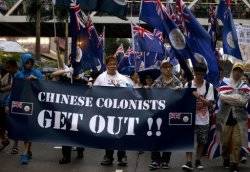Tens of thousands of protesters have marched in Hong Kong to denounce the city's leaders and demand universal suffrage as the region marked 16 years since its handover to China.
Organizers of the protest said on Monday about 430,000 people turned up, while police gave an estimate of 66,000, according to Reuters news agency.
The rally has taken place amid concerns in the southern Chinese city that Beijing, which regained control from Britain in 1997, is increasingly meddling in its affairs.
A widening income gap and soaring property prices are also among grievances, as protesters focus their anger on Leung Chun-ying, Hong Kong's unpopular chief executive.
Al Jazeera's Scott Heidler, reporting from Hong Kong, said the pro-democracy protests had begun with tens of thousands of protesters marching into the central part of the city and braving awful weather.
He said top issues they wanted tackled were “the right to vote, the resignation of Leung, and narrowing the wealth gap - the difference between the haves and have-nots”.
There had been concerns that the march would be threatened by Tropical Storm Rumbia, which has brought adverse weather during the afternoon.
Genuine democracy
Protesters were however undeterred by the lashing rain as the march began. Some were carrying British colonial Hong Kong flags and pro-democracy banners along with umbrellas.
Jackie Hung of the Civil Human Rights Front, which organized the march, told the AFP news agency that the protesters' main goal was to "push through for genuine democracy and to ask for Leung Chun-ying to step down".
Earlier on Monday, China's national anthem blared as the Chinese and Hong Kong flags were raised outside the harbour-side Convention Centre in a ceremony to mark the anniversary of its handover.
A small but rowdy protest took place near the ceremony, with demonstrators burning a photograph of Leung and pushing and shoving with police.
The July 1 rally comes after a survey published by the Hong Kong University found that only 33 percent of Hong Kongers took pride in being a Chinese national, the lowest level since 1998.
Leung was appointed by a pro-Beijing committee last July, promising to improve governance and uphold the rule of law in the territory of seven million people.
Hong Kong reverted to Chinese rule in 1997, ending more than 150 years of British administration.
Although part of mainland China with semi-autonomous status, the city's 7.1 million residents choose their chief executive under a system called "small-circle" election that excludes many would-be voters.
PHOTO CAPTION
Protesters rally for democracy on July 1, 2013 in Hong Kong carrying British-era flags.
Aljazeera


 Home
Home Discover Islam
Discover Islam Quran Recitations
Quran Recitations Lectures
Lectures
 Fatwa
Fatwa Articles
Articles Fiqh
Fiqh E-Books
E-Books Boys & Girls
Boys & Girls  Articles
Articles










